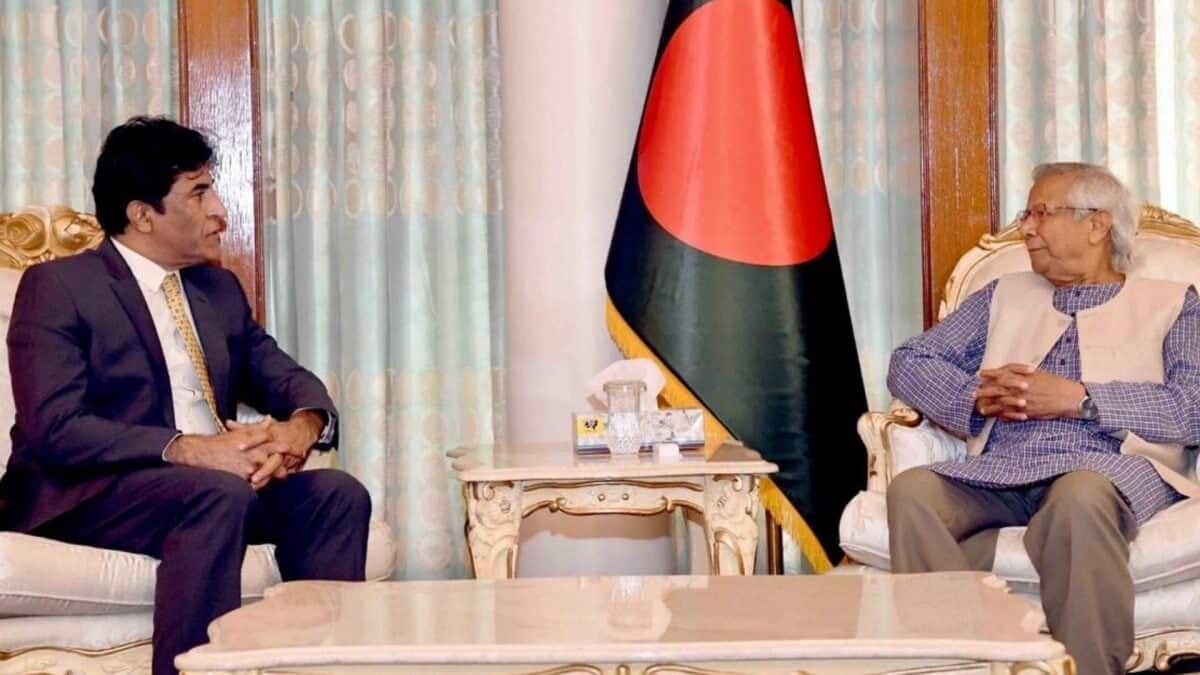
After Hasina's ouster, Pakistan strengthens diplomatic ties with Bangladesh
What's the story
Pakistan has been increasing its diplomatic engagement with the interim government in Bangladesh, led by Muhammad Yunus. Islamabad, which previously had a strained relationship with Dhaka under Sheikh Hasina's government due to its refusal to apologize for the 1971 war crimes, is now actively holding a series of meetings with members of the interim administration. These discussions have been ongoing since Hasina resigned and fled the country on August 5, leading to the dissolution of her government.
Context
Why does this story matter?
Last month, amid widespread protests, Hasina—Bangladesh's longest-serving PM—resigned and fled to India. The student protests—which started in July with demands to abolish civil service job quotas—quickly grew into a wider anti-government movement. Over 230 people were killed in the nationwide violence following the fall of Hasina's Awami League government, raising the death toll to over 600 since the protests began. Hasina's government was succeeded by an interim administration, with 84-year-old Nobel laureate Yunus appointed as its chief advisor.
Diplomatic conversation
Pakistan's PM Sharif discusses bilateral relations
Officials from Pakistan's High Commission in Dhaka have been in discussions with members of Bangladesh's interim government on a range of topics, including flood relief, student exchange programs, sports, IT, youth, and cultural cooperation. Details of these meetings have been shared on X by the Pakistan High Commission in Dhaka. On Friday, August 30, Pakistan's Prime Minister Shehbaz Sharif spoke with Muhammad Yunus by phone, emphasizing the importance of revitalizing bilateral relations through enhanced cooperation across various sectors.
Twitter Post
Read Pakistan High Commission's statement on the call here
Telephone Conversation between Prime Minister of #Pakistan & Chief Adviser, Government of #Bangladesh
— Pakistan High Commission Bangladesh (@PakinBangladesh) August 30, 2024
Today, the Prime Minister of Pakistan, Muhammad Shehbaz Sharif held a telephone conversation with H.E. Professor Muhammad Yunus, @ChiefAdviserGoB.
1/4 pic.twitter.com/TS2rtiJanB
Flood relief
Pakistan PM expresses sympathies over Bangladesh floods
Sharif also expressed sympathies over the devastation caused by recent floods in Bangladesh during his call with Yunus. Separately, on August 27, the Pakistan High Commission called on Yunus and discussed "matters of mutual interest including ways and means to take bilateral relations forward." The next day, Pakistan's foreign secretary met with Bangladesh's foreign affairs adviser on the sidelines of an Organization of Islamic Cooperation (OIC) meeting.
Post-ouster meeting
Pakistan's high commissioner meets BNP leaders
Additionally, hours after the ouster of the Hasina government, the Pakistan High Commissioner in Dhaka met with Bangladesh Nationalist Party (BNP) leaders. Notably, relations between Pakistan and Bangladesh remained strained during Hasina's 15-year rule, largely due to historical grievances dating back to the 1971 Bangladesh Liberation War. Despite numerous attempts by Pakistan to improve ties, Hasina consistently rebuffed these efforts, reports said.